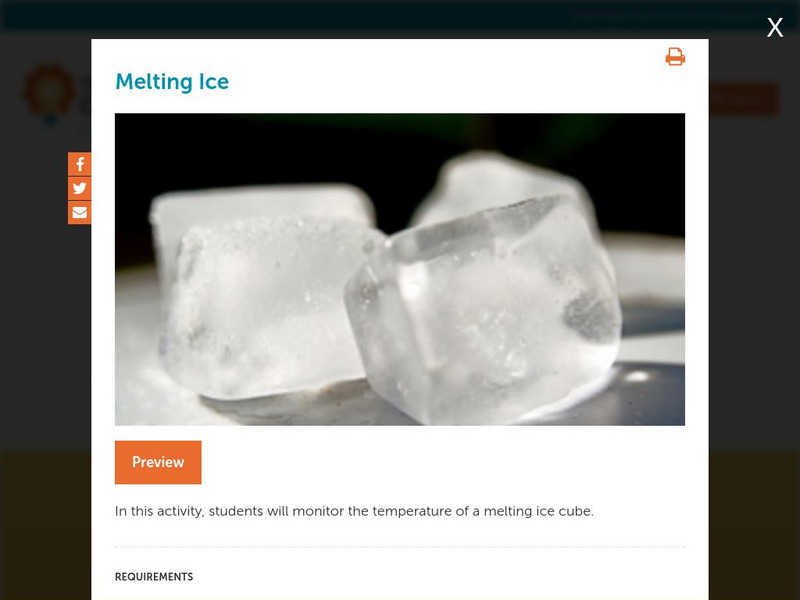Hi, what do you want to do?
Curated OER
Safety Comes First
Here is a thorough lesson on safety in the chemistry lab. Chemists review a detailed list of safety rules, draw the layout of the laboratory area to include emergency equipment, identify hazard warnings, and consult the MSDS in order to...
Curated OER
Exothermic Reactions
Students experiment, observe, measure, and analyze what occurs during an exothermic reaction. They safely design an experiment, control variables, and properly dispose of materials.
American Chemical Society
Middle School Chemistry: Lesson Plans: Temperature Changes in Dissolving
Media-rich lesson in which young scholars discover that it takes energy to break bonds, and that energy is released when bonds are formed during the process of dissolving. They also determine whether dissolving is either exothermic or...
Massachusetts Institute of Technology
Mit: Open Course Ware: Courses: Kitchen Chemistry
College-level online course focusing on kitchen chemistry. Course explores the application of chemistry in recipes and cooking. Course features include links to readings, lecture notes, and a wealth of related links.
Science Buddies
Science Buddies: Project Ideas: Crazy Crystal Creations: Grow Crystals
Compare the size and shape of crystals grown in different temperature conditions in this science fair project. The Science Buddies project ideas are set up consistently beginning with an abstract, objective, and introduction, followed by...
Dartmouth College
Dartmouth College: Qualitative Analysis of Anions
"In this experiment, you will observe the reactions of some simple salts, analyze common household chemicals, and identify an unknown sample by testing its reactivity."
Dartmouth College
Dartmouth College: Chem Lab: Natural Salt Solutions 1: Ion Exchange
In this experiment, you will concentrate on understanding the chemistry of ion exchange and estimate the capacity of an ion exchange column from your observations.
Dartmouth College
Dartmouth College: Acids, Bases, and Buffers 1: Monoprotic and Polyprotic Acids
In this experiment, you will explore the behavior of the monoprotic acid (acetic acid) and the polyprotic acid (phosphoric acid). By titrating, you will examine the acid and conjugate base species present across the pH scale and the...
Dartmouth College
Dartmouth College: Chem Lab: Chemical Kinetics 1
In this experiment, you will determine the rate law and confirm the mechanism of the reaction between cyclohexanone and iodine. Requires Java and QuickTime plug-ins to access some features.
Dartmouth College
Dartmouth College: Chem Lab: Chemical Kinetics 2
This lab further analyzes the results of the experiments carried out in Chemical Kinetics 1. In addition, you will carry out experiments to determine the temperature dependence of the reaction rate constant. Requires Java plug-in.
Dartmouth College
Dartmouth College: Chem Lab: Spectrum of the Hydrogen Atom
In this experiment, you will use a meterstick spectroscope to observe the emission spectrums of hydrogen, sodium, neon, helium, and mercury. Requires Java plug-in.
Dartmouth College
Dartmouth College: Chem Lab: Spectra of Conjugated Dyes & Beer's Law
In the first part of this lab, you will measure the absorption spectra of two conjugated dyes and compare the results to the theoretical predictions of a particle-in-a-box model. In the second part of the experiment, you will identify...
Dartmouth College
Dartmouth College: Chem Lab: Coordination Chemistry 3.2
In this experiment, you will study the reaction between your cobalt complex and the nitrite ion. The nitrite ion can exchange with a water ligand and the mechanism of this ligand exchange will be investigated. Requires Java plug-in.
Dartmouth College
Dartmouth College: Chem Lab: Coordination Chemistry: Kinetics of Ligand Exchange
In this experiment, you will complete the study of the mechanism of ligand exchange. The reaction will be followed colorimetrically and the rates of exchange and ligand isomerization will be measured. Requires Java plug-in.
Dartmouth College
Dartmouth College: Chem Lab: Coordination Chemistry 3.1: Acid/base Analysis
In this experiment, you will examine the acidity of your coordination complex's water ligand. You will determine the acid dissociation constant of the complex by titrating it with a base. There are eight weeks of experiments in this series.
Concord Consortium
Concord Consortium: Stem Resources: Melting Ice
Using temperature probes, students will monitor the temperature of melting ice cubes in different situations. This lab activity, allows students to view the procedure and answer questions online that can be saved and evaluated by the...
American Chemical Society
American Chemical Society: Inquiry in Action: Teach Science Well
Online textbook reviews fundamentals of chemistry and physical science via slideshow presentations, notes, and videos. Materials for classroom activities engage students in inquiry-based, hands-on investigations covering molecular...
American Chemical Society
American Chemical Society: Inquiry in Action: Teach Science Well
Online textbook reviews fundamentals of chemistry and physical science via slideshow presentations, notes, and videos. Materials for classroom activities engage students in inquiry-based, hands-on investigations covering molecular...
Concord Consortium
Concord Consortium: Stem Resources: Baggie Chemistry
Observe chemical and physical changes with this lab using everyday household items. Lab includes procedure and online data collection tool where answers can be saved and graded by teacher.
Massachusetts Institute of Technology
Mit: Open Course Ware: Advanced Kitchen Chemistry
College-level advanced course on kitchen chemistry. Course topics highlight the scientific exploration of all types of food. Features online include downloadable assignments and readings, and a number of food chemistry-related links.
Science Education Resource Center at Carleton College
Serc: Mass Spectrometry: Using a Game Format to Develop Logic Skills
Learners will use previous knowledge of chemistry concepts and skills to interpret mass spectrometry graphs and will learn to determine one or more possible formulas for an organic molecule represented on the graph. They will also gain...
Dartmouth College
Dartmouth College: P H Meter Analog
Use this site to find out what a pH meter is and how to use it in this informative and concise site.
Dartmouth College
Dartmouth College: Digital P H Meter
This site explains how a digital pH meter uses an electrode to measure the pH of a solution Find out how to use this instrument in this informative site.
Royal Society of Chemistry
Royal Society of Chemistry: Kitchen Chemistry
A scientific approach to kitchen skills takes a look at the chemistry involved in preparing the food we eat.















